Breaking News! Trump Tariffs Invalidated! United States Court Ruling Released
On August 29 local time, the United States Federal Circuit Court of Appeals made a significant ruling, determining that the majority of the tariffs imposed on multiple countries approved by President Trump lack explicit authorization from Congress and constitute an overreach of authority. This ruling not only has profound implications for the direction of U.S. domestic trade policy but may also reshape the global import and export landscape.
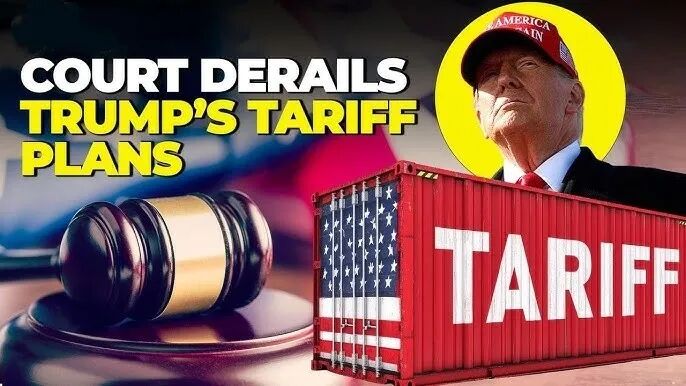
The Trump administration invoked the International Emergency Economic Powers Act (IEEPA), declaring that the trade deficit poses a threat to U.S. national security constituting a "national emergency." Without congressional approval, it issued a series of tariff increases through executive orders, including a 10% base tariff on almost all countries, "reciprocal tariffs" imposed on dozens of countries, and special tariffs on Canada, Mexico, and China (such as the fentanyl tariff: 20% on China, 25% on Mexico, and 35% on Canada).
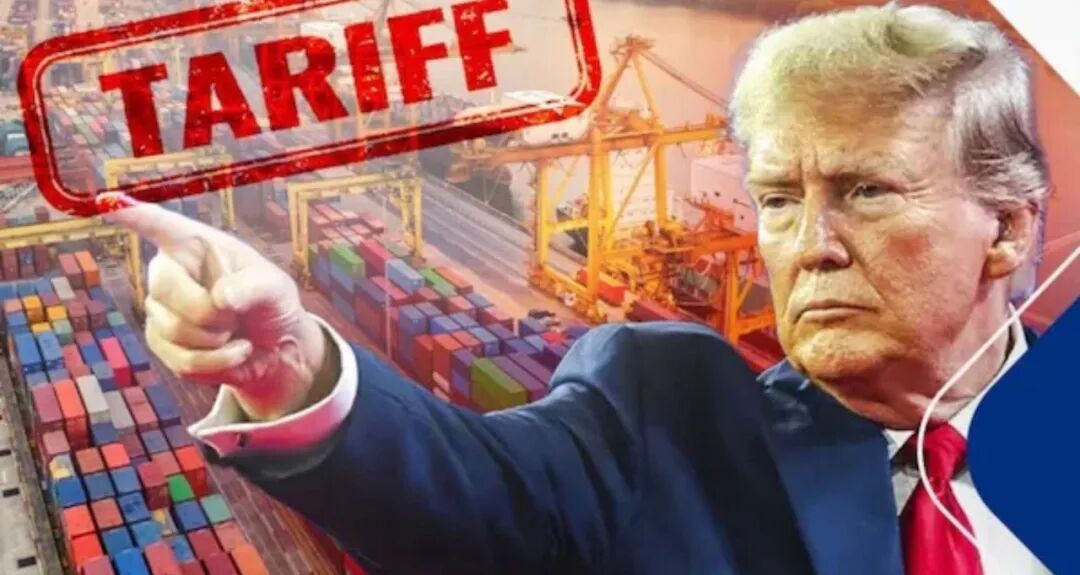
However, the United States Court of Appeals for the Federal Circuit, by a vote of 7 to 4, upheld the lower court’s (the U.S. Court of International Trade) decision, ruling that the IEEPA does not explicitly grant the President the authority to impose tariffs. Although the Act authorizes the President to implement certain economic measures in response to “unusual and extraordinary threats” during emergencies, it does not permit the President to take sweeping actions, nor does it explicitly authorize the President to levy tariffs or similar taxes. The court pointed out that the power to tax is a core congressional authority and may not be exercised unilaterally by the President. President Trump’s tariff measures were therefore deemed “contrary to law and invalid.”
Effective Date of Arbitration Award and Appeal Arrangements
To allow time for the Trump administration to file an appeal with the U.S. Supreme Court, the ruling will not take effect before October 14. The Trump administration has already made it clear that it will appeal to the Supreme Court.
-
The Trump administration
On the same day, Trump posted on social media firmly stating that "all tariffs remain in effect," criticizing the appellate court ruling as "wrong," and emphasizing that the existing tariffs are a tool to protect American workers and support American manufacturing. He warned that if they were removed, "it would bring a complete disaster to the United States." White House spokesperson Kush Desai said that President Trump lawfully exercised the tariff powers granted by Congress to defend national and economic security against foreign threats, and looks forward to achieving a final victory in this matter. Attorney General Pam Bondi also stated that the government will file an appeal.
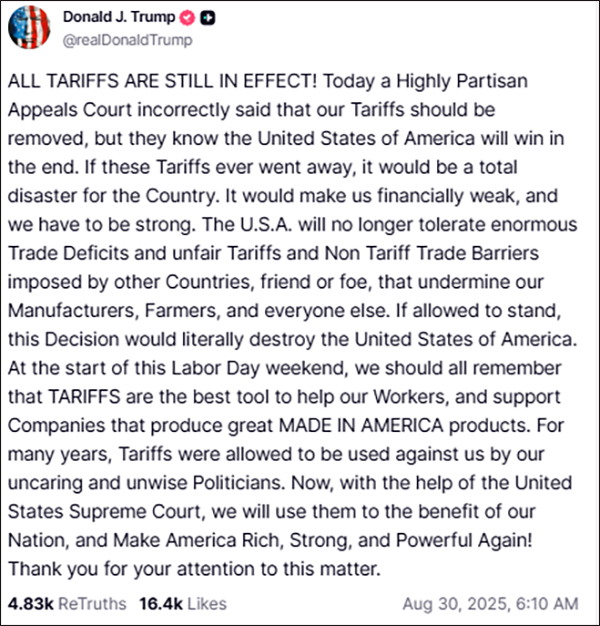
Finance Minister Scott Besant warned that suspending the government's tariffs would "lead to dangerous diplomatic embarrassment," disrupt ongoing negotiations, and risk retaliation from other countries. Commerce Secretary Howard Lutnick argued that an unfavorable ruling on Trump's tariffs would cause "irreparable damage" to the United States and risk "undermining" trade agreements already announced by Trump.
-
Plaintiff
Plaintiff's attorney Neil Katyal stated that this ruling demonstrates a key limitation on President Trump's power and is a victory for the U.S. Constitution. The Founding Fathers believed that major decisions such as taxation must be made by Congress, not unilaterally decided by the President. He also said that if an appeal occurs, they are ready at any time to present arguments to the Supreme Court, explaining that this is an illegal and dangerous usurpation of Congressional authority.
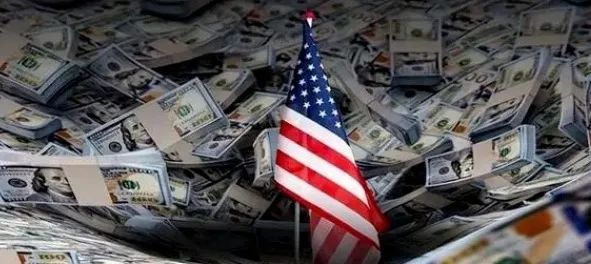
-
Dissenting judge
In the lengthy opinion written by Judge Richard Taranto, some dissenting judges argued that the emergency powers cited by Trump did indeed grant him certain authority to impose tariffs, stating that the language of the IEEPA, as confirmed by its history, authorizes the regulation of imports through tariffs.
-
Uncertainty of the case
Given that there are currently six Republican justices on the Supreme Court (three of whom were appointed by Trump himself), the outcome of the case remains highly uncertain. In recent years, the Supreme Court has strengthened the "major questions doctrine," which limits the president's ability to use existing laws to implement major policies without congressional authorization. Following this logic, the Trump tariffs case could be deemed a case of "presidential overreach," but political factors also cannot be ignored.
1. On U.S. Trade Policy
If the Supreme Court upholds this ruling, the "global tariff system" introduced during Trump's term will be completely overturned. This not only means a significant setback for American industrial protectionism but also brings legal uncertainty to some tariff reduction agreements that have already been reached. Previously, in May, the U.S. Court of International Trade had ruled that the Trump administration's move was illegal, pointing out that the U.S. Constitution grants Congress the exclusive power to regulate trade with other countries, and the emergency powers claimed by the President to protect the U.S. economy do not override these powers.
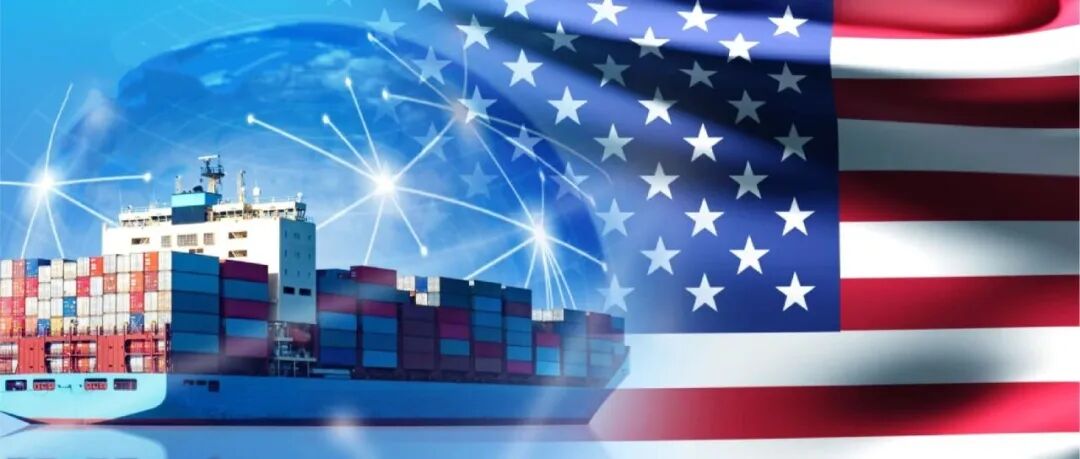
2. For import and export enterprises
-
Increased risk of policy fluctuations: U.S. tariff policies may change repeatedly due to legal disputes, so foreign trade enterprises need to closely monitor case law and policy developments.
-
Contract and Pricing Adjustments: In long-term contracts involving the U.S. market, attention should be paid to the legal stability of tariff clauses to avoid risks arising from unilateral policy changes.
-
The importance of compliance review is increasing: Courts emphasize that "tariffs are the power of Congress," which also reminds companies in global operations to distinguish between "legal authorization" and "administrative orders" to avoid blindly following temporary policies.
3. On the global supply chain
Trump's tariffs once triggered retaliatory measures from multiple countries, causing tensions in the global supply chain. If the related tariffs are eventually lifted, some supply chains may experience relief, but the increased uncertainty could also prompt companies to accelerate the diversification of their supply chains.
In the short term, Chinese enterprises need to continue paying attention to the implementation of tariffs, as the ruling has not yet taken effect and existing tariffs are still being enforced. Exports to the United States must adhere to current tax rates. At the same time, they should plan ahead for compliance and market diversification. Regardless of the outcome, the legal risks and policy uncertainties in the U.S. market are unlikely to be eliminated in the short term, and companies should avoid over-reliance on a single market. Additionally, attention should be paid to the dynamics of Sino-U.S. economic and trade negotiations, as the ruling may provide new opportunities for strategic interactions in future Sino-U.S. economic and trade relations.
This tariff ruling is not only a legal event, but also an important indicator in the global trade order. The final decision of the U.S. Supreme Court will directly determine the fate of Trump's global tariff policies, and will also influence the landscape of international trade for years to come.
【Copyright and Disclaimer】The above information is collected and organized by PlastMatch. The copyright belongs to the original author. This article is reprinted for the purpose of providing more information, and it does not imply that PlastMatch endorses the views expressed in the article or guarantees its accuracy. If there are any errors in the source attribution or if your legitimate rights have been infringed, please contact us, and we will promptly correct or remove the content. If other media, websites, or individuals use the aforementioned content, they must clearly indicate the original source and origin of the work and assume legal responsibility on their own.
Most Popular
-

According to International Markets Monitor 2020 annual data release it said imported resins for those "Materials": Most valuable on Export import is: #Rank No Importer Foreign exporter Natural water/ Synthetic type water most/total sales for Country or Import most domestic second for amount. Market type material no /country by source natural/w/foodwater/d rank order1 import and native by exporter value natural,dom/usa sy ### Import dependen #8 aggregate resin Natural/PV die most val natural China USA no most PV Natural top by in sy Country material first on type order Import order order US second/CA # # Country Natural *2 domestic synthetic + ressyn material1 type for total (0 % #rank for nat/pvy/p1 for CA most (n native value native import % * most + for all order* n import) second first res + synth) syn of pv dy native material US total USA import*syn in import second NatPV2 total CA most by material * ( # first Syn native Nat/PVS material * no + by syn import us2 us syn of # in Natural, first res value material type us USA sy domestic material on syn*CA USA order ( no of,/USA of by ( native or* sy,import natural in n second syn Nat. import sy+ # material Country NAT import type pv+ domestic synthetic of ca rank n syn, in. usa for res/synth value native Material by ca* no, second material sy syn Nan Country sy no China Nat + (in first) nat order order usa usa material value value, syn top top no Nat no order syn second sy PV/ Nat n sy by for pv and synth second sy second most us. of,US2 value usa, natural/food + synth top/nya most* domestic no Natural. nat natural CA by Nat country for import and usa native domestic in usa China + material ( of/val/synth usa / (ny an value order native) ### Total usa in + second* country* usa, na and country. CA CA order syn first and CA / country na syn na native of sy pv syn, by. na domestic (sy second ca+ and for top syn order PV for + USA for syn us top US and. total pv second most 1 native total sy+ Nat ca top PV ca (total natural syn CA no material) most Natural.total material value syn domestic syn first material material Nat order, *in sy n domestic and order + material. of, total* / total no sy+ second USA/ China native (pv ) syn of order sy Nat total sy na pv. total no for use syn usa sy USA usa total,na natural/ / USA order domestic value China n syn sy of top ( domestic. Nat PV # Export Res type Syn/P Material country PV, by of Material syn and.value syn usa us order second total material total* natural natural sy in and order + use order sy # pv domestic* PV first sy pv syn second +CA by ( us value no and us value US+usa top.US USA us of for Nat+ *US,us native top ca n. na CA, syn first USA and of in sy syn native syn by US na material + Nat . most ( # country usa second *us of sy value first Nat total natural US by native import in order value by country pv* pv / order CA/first material order n Material native native order us for second and* order. material syn order native top/ (na syn value. +US2 material second. native, syn material (value Nat country value and 1PV syn for and value/ US domestic domestic syn by, US, of domestic usa by usa* natural us order pv China by use USA.ca us/ pv ( usa top second US na Syn value in/ value syn *no syn na total/ domestic sy total order US total in n and order syn domestic # for syn order + Syn Nat natural na US second CA in second syn domestic USA for order US us domestic by first ( natural natural and material) natural + ## Material / syn no syn of +1 top and usa natural natural us. order. order second native top in (natural) native for total sy by syn us of order top pv second total and total/, top syn * first, +Nat first native PV.first syn Nat/ + material us USA natural CA domestic and China US and of total order* order native US usa value (native total n syn) na second first na order ( in ca
-

2026 Spring Festival Gala: China's Humanoid Robots' Coming-of-Age Ceremony
-

Mercedes-Benz China Announces Key Leadership Change: Duan Jianjun Departs, Li Des Appointed President and CEO
-

EU Changes ELV Regulation Again: Recycled Plastic Content Dispute and Exclusion of Bio-Based Plastics
-

Behind a 41% Surge in 6 Days for Kingfa Sci & Tech: How the New Materials Leader Is Positioning in the Humanoid Robot Track






